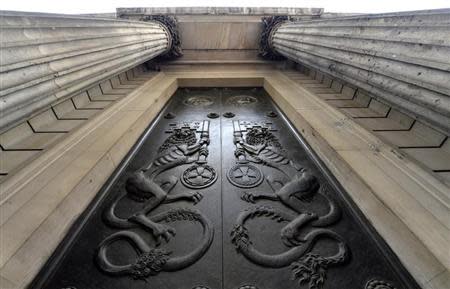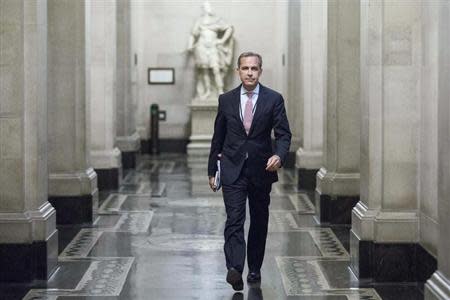Bank of England sits tight on policy as recovery builds
By Christina Fincher LONDON (Reuters) - The Bank of England left interest rates at record lows on Thursday but is likely to suggest next week that borrowing costs could rise sooner than it had forecast as the economic recovery gathers pace. Britain is now in a very different position from the euro zone, where weak growth and a slump in inflation prompted the European Central Bank to cut its refinancing rate to a new record low of 0.25 percent. When the BoE launched its "forward guidance" plan three months ago, it said it would not raise rates until unemployment fell to 7 percent, something it predicted would not happen until well into 2016. With growth picking up, house prices rising at double the rate of inflation and signs that broader price pressures are building, many economists - including former Bank policymaker Deanne Julius - believe a rate rise could be warranted much sooner than the BoE is suggesting. Julius, who was considered a dove when she served on the Monetary Policy Committee a decade ago, said Britain's economy was now in full recovery mode, helped by government's Help to Buy scheme to kick-start the housing market. "Help to Buy has really been the spark that lit the fire," she told a monetary policy discussion organized by Fathom Financial Consulting. "Of course a fire gives you a nice warm glow for a while but it can easily get out of control." The BoE will publish updated forecasts for growth, inflation and unemployment next Wednesday. An upward revision to growth looks certain after the economy grew by 0.8 percent in the third quarter - the fastest rate in more than three years. Mindful that higher government bond yields could choke off the recovery, the Bank will be wary of sending a hawkish message but it is likely to move its unemployment forecast a bit closer to those of private economists. Minutes to last month's Monetary Policy Committee meeting showed policymakers concluded that it now "seemed probable that unemployment would be lower, and output growth faster, in the second half of 2013 than expected at the time of the August Inflation Report." UK interest rates have stood at a record-low 0.5 percent since March 2009 as policymakers have sought to shore up an economy battered by the financial crisis and a heavy overhang of debt. Britain's economic turnaround has been dramatic. Seen as a recovery laggard at the start of the year, Britain now has one of the fastest-growing economies in the G7. As the economy has picked up speed, calls for more stimulus from a minority of the BoE's policymakers have faded away. The Bank's Monetary Policy Committee opted on Thursday to leave its bond-buying programme unchanged at 375 billion pounds ($603 billion), as expected by all the economists who took part in a Reuters poll. (Additional reporting by William Schomberg; Editing by Hugh Lawson)

 Yahoo Finance
Yahoo Finance 

